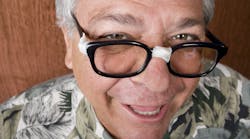How I made peace with sleep after busting myths and misconceptions
"Dear sleep, I'm sorry we broke up this morning. I want you back."—Anonymous
It was long ago, but I clearly remember the days when I fell asleep within minutes of my head hitting the pillow and slept soundly all night, through thunderstorms and even sometimes through my alarm clock. Those days came to a sudden halt when I became pregnant with my first child, and my sleep has never been the same again. What happened?
Like many with sleep issues, I tried different strategies to regain restful sleep, including melatonin, no screens near bedtime, no caffeine after 12 noon, no alcohol, a new mattress, a new pillow, chamomile tea, CBD drops, sleeping apart from my husband, darkening the room, white noise, meditating, breathing exercises, going to bed and rising at the same time every day, and many more little tips and tricks. I read every sleep article that popped up on my computer screen. Nothing worked.
I blamed my kids. After all, my sleep difficulties had begun when I was pregnant. That was also when I experienced my first panic attacks, waking up in a sweat, feeling like I was being suffocated, and terrified of what seemed like some unknown presence in the room. Then came the physical discomfort that accompanies late pregnancy, making sleep extra difficult. And then came the baby, along with the inevitable sleep deprivation babies and young children bring.
Then the teen years and beyond, stressing out over their mental health (at the expense of my own). It was all my kids' fault! They threw me off my sleep, and even after they grew up and moved out of the house, sleep didn't return to what I considered "normal." My body had forgotten what good sleep was, although my mind remembered, and I desperately wanted it back again.
Sleep: the golden chain that ties health and body together
I am certainly not alone in thinking that my sleep should be better. If you google "Why can't," one of the first autosuggestions will be "Why can't I sleep?" The sleep aid industry is projected to reach $112.7 billion in 2025.1 Smart mattresses, weighted blankets, sleep prescriptions, and sleep apps are becoming increasingly popular as we search for that elusive restful night's sleep.
The problem is that sleep cannot be controlled. In fact, have you ever awakened at 2 AM and thought about the busy day ahead, and just how much you need to be rested, and you really need to sleep, and your body just mocks you and your brain is frantically jumping from one thought to another? And you lie there, willing yourself to go back to sleep. But the more you wish you can fall asleep, the more awake you feel.
You think, "I'm going to be miserable all day tomorrow." And you look at the clock. Now it's 3 AM and you think, "I've got to be up in three hours. I fell asleep around 11, so that's, let's see, 11 to 2 is three hours, and if I fall asleep right now, I can get three more hours … that's a total of six hours, which is not great, but not too terrible …" And then you toss and turn some more, and the next time you check the clock it's 4 AM and you think, "Even if I fall asleep right now, it won't be enough, and just when I'm in a nice deep sleep, the alarm will go off, and I'll feel even worse than I do now, so maybe I should just get up now, but what am I going to do at 4 AM?"
Although we desperately try, we can't control sleep. According to Jade Wu, PhD, a board-certified behavioral sleep medicine specialist and researcher at Duke University School of Medicine, "You can't simply turn the dials on sleep. There are no dials. Sleep is too complex and too beautiful for that. Scientists have been studying it for centuries and we still don't really understand what it is, much less precisely how it works."1
But we do know some things about sleep. We know that it is necessary for good health. When our bodies don't get enough sleep-or get poor quality sleep-over an extended period of time, it can affect many of our body systems, including heart and circulatory, metabolic, immune, nervous, brain, and mental health.2 As dental professionals, we know that problems with sleep can also affect oral health. Conversely, these oral conditions can affect the quality of sleep.
Sleep and oral health
There are many excellent articles for dental practitioners on the oral problems that can occur during sleep, so I will discuss them only briefly here.
Obstructive sleep apnea (OSA): The most common sleep-related disorder in which people repeatedly start and stop breathing during sleep3
Bruxism: A sleep-related movement disorder in which a person gnashes or clenches their teeth during sleep. (It can also occur during the day.)3
Gastroesophageal reflux disease (GERD): A condition in which stomach acid flows back up into the esophagus, irritating the lining. It can lead to acid erosion of the teeth.3
Chronic mouth breathing: Breathing through the mouth rather than the nose. It can cause sleep disturbances and change the structure of the face.3
Xerostomia: Dry mouth. It can be caused by medications, reduced salivary flow, cancer therapy, and other causes. It can lead to dental disease and sleep disturbances.4
Snoring: The noise caused by air flowing past relaxed tissues in the throat, causing the tissues to vibrate. Snoring can be associated with OSA.4
Hypersalivation: Occurs when salivary glands produce more saliva than usual. It may be chronic or temporary. It may be caused by an underlying condition such as pregnancy, infection, or conditions that affect muscle control.4
Burning mouth syndrome: A burning sensation in the mouth, often without an obvious cause
Orofacial pain: A general term for pain in the mouth, jaw, and face4
Oral ulcers: Small sores that form in the mouth. Ulcers have many causes including trauma, hormones, lichen planus, oral cancer, and emotional stress.5
The mystery of sleep
For many of us, dental practitioners and patients alike, the problem is not any of the above, but rather sleep itself. To function optimally, we need refreshing sleep. I thought I knew a lot about sleep. After all, I read every article I stumbled across online (and once you read one, they just keep coming unbidden). I read all the boring stuff about sleep stages and the endless lists of 10 tips for better sleep. But it wasn't until a book in the library caught my eye that I really began to understand sleep. I say "began" to understand because nobody really understands this complex subject completely. After reading Hello Sleep by Jade Wu, I realized how much misinformation is out there and how little I actually knew about sleep.
Changes in sleep patterns
So, what happened to my sleep? Well, unfortunately for women, their hormones play a big role in sleep changes.1 Changes in sleeping patterns frequently occur during puberty, pregnancy, postpartum, and menopause. Aging, physical and mental health conditions, and changing social roles also change sleep.1 These changes don't necessarily mean that the quality of sleep will suffer. It does mean that we need to adapt. For instance, the circadian phase begins to shift earlier around age 60 to 65.1 This means that we are likely to feel sleepy earlier and wake up earlier, so adjustment to bedtime and rising times might be necessary. A scheduled midday nap might also be beneficial, especially as we age.
Putting worries to bed
By understanding sleep a little more, I have begun to sleep better, knowing that much of what I considered abnormal was actually normal. I no longer fret when I wake up in the middle of the night. Most of the time I just roll over and go back to sleep. Sometimes I still wake up in the middle of the night and can't go back to sleep. When that happens I tell myself that although I may be sleepy when I get up, I will still get through the day OK and will probably sleep better the next night. Then I turn the light on and read, and usually that makes me sleepy again. If I'm going to be awake anyway, I might as well do something I enjoy rather than get angry at myself for refusing to sleep on command.
I've just touched on a tiny portion of what I've learned from reading Dr. Wu's book. Most importantly for me, by better understanding what sleep is, I have learned to adjust my thinking, which in turn has led to making peace with sleep. As Dr. Wu says in the prologue to her book, "Sleep is a friend, not an engineering problem." I still don't sleep like I did before having children, but I also don't toss and turn and check the clock and worry about getting through the next day like I did before. Sleep is no longer the enemy that I battle with every night. At long last, sleep has truly become my friend.
References
- Wu J. Hello Sleep. St. Martin's Publishing Group; 2023.
- Sleep deprivation. Cleveland Clinic. Last reviewed August 11, 2022. https://my.clevelandclinic.org/health/diseases/23970-sleep-deprivation
- Huynh NT, Emami E, Helman JI, Chervin RD. Interactions between sleep disorders and oral diseases. Oral Dis. 2014;20(3):236-245. https://pubmed.ncbi.nlm.nih.gov/23815461/
- Huang Z, Zhou N, Lobbezoo F, et al. Dental sleep-related conditions and the role of oral healthcare providers: a scoping review. Sleep Med Rev. 2023;67:101721. https://pubmed.ncbi.nlm.nih.gov/36446166/
- Mouth ulcer. Cleveland Clinic. Last reviewed June 6, 2023. https://my.clevelandclinic.org/health/diseases/21766-mouth-ulcer
- Pacheco D, Truong K. How electronics affect sleep. Sleep Foundation. Updated June 2, 2023. https://www.sleepfoundation.org/how-sleep-works/how-electronics-affect-sleep
- How much sleep do you really need? National Sleep Foundation. October 1, 2020. https://www.thensf.org/how-many-hours-of-sleep-do-you-really-need/








